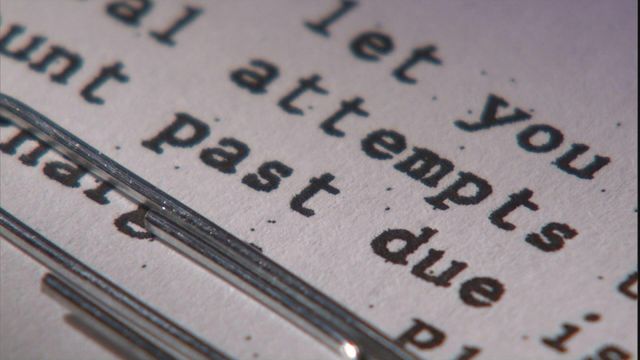Old debts must be dealt with sooner or later
Plenty of people think when the collection agency phone calls and letters stop, it means the collections agency gave up and wrote off the debt.
Posted — UpdatedTimes are tough right now. People lose jobs, money gets tight, and bills go unpaid. It's a situation a lot of people are in right now. You might not know this, but it could cost you your car or savings, as much as 20 years later.
Plenty of people think when the collection agency phone calls and letters stop, it means the collections agency gave up and wrote off the debt. That's what Erin Miles thought. She had a tough time years ago. "The company I was working for closed, and I lost my job," Miles said.
She had credit card insurance, which she thought covered payments if she lost her job. "It picked up a couple of payments, and then it stopped," said Miles. With no paycheck coming in, the $3,400 balance was more than she could afford. So, she let it go.
A collection agency sent letters and court orders, which Miles admits she didn't fully understand and ignored. Years later, her credit report showed the bill as "paid." She thought the debt was cleared.
Then 10 years after the bill went unpaid, the 2006 Honda Accord she recently paid off, was gone. "I was told the car was taken for a debt," said Miles.
She's not alone in this situation. Eva Williams contacted WRAL about credit card debt from 15 years ago. Back then, she owed $3,000. The 68-year old thought disability insurance paid it. But recently, a collection agency contacted her wanting more than $10,000. For Williams, because of her current circumstances, the company decided to no longer pursue the debt.
That won't be the case for the majority of people. "They could take your car, could take your house. They could take your household goods," warned attorney Travis Sasser.
He says his law firm has seen a significant increase in cases of collections firms going after old debt. They have up to 20 years to pursue payment. Often, collectors watch and wait, until you have assets worth seizing.
"They like to take people's cars," said Sasser. "And they like to freeze their bank accounts." He adds, it doesn't matter if the collection calls and letters stop, or if the debt no longer appears on your credit report, as in Erin Miles' case.
"At some point, something's gonna have to be done with it," said Sasser. "It's either gonna have to be paid off, settled, bankrupted," added Sasser. "You can't just leave it sitting out there, unresolved for the long-term."
And as the debt sits unpaid, it grows.
"The interest and the late fees do add up, and I'm afraid it doesn't really matter what the original amount was," said Sasser. "All they really care about is the present balance that's owed on the debt."
For Miles, that initial $3,400 debt ballooned to more than $6,700. In the eleventh hour, she managed to pay off the debt and get her car back. But now, she has advice for anyone who has debt they can't pay: Don't ignore paperwork, don't assume a bill has gone away, and contact the creditor immediately. "Because once they have your property, there's almost nothing that you can do."
One more thing, Sasser says it is a common misconception that the court system will get involved in helping to set up some sort of payment plan, but it will not. The bottom line: When you can't afford to pay a bill, it's a difficult situation, but it is not a defense.
• Credits
Copyright 2024 by Capitol Broadcasting Company. All rights reserved. This material may not be published, broadcast, rewritten or redistributed.





